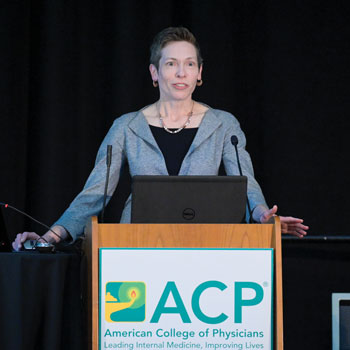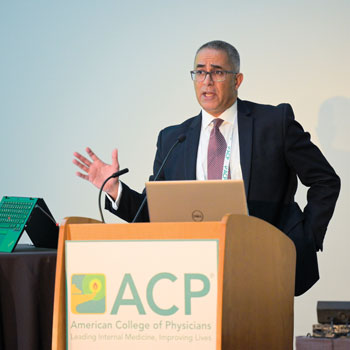Leadership, Leadership Day, and ‘purple’ as a guide
ACP's Chief Advocacy Officer issues a challenge to members of the College to be more “purple” in their outlook in order to achieve goals as a team, even when they disagree.
I've been thinking a lot about what it means to be a leader, not only for myself, but for ACP's governmental affairs staff in their areas of expertise and particularly for our members both in and outside of the exam room. This includes being leaders when it comes to advocacy and, yes, even leaders in the world of politics.
I am a sucker for books on management and leadership and recently came across a book called the “Purple People Leader,” which spoke to me in several ways. One, my all-time favorite color is purple, and it is the color most associated with my favorite musical artist (more on that later), but also, there seems to be so very little leadership these days when it comes to government.
The concept is that to truly lead a team, you do not abandon what are typically considered red or blue views, but you also dig down to the core goals that you are trying to achieve. Develop relationships, get to know others, build trust, have compassion and understanding, and then put in the work to see where you can find solutions that might just make everyone a little bit happy or even a little bit unhappy, and go from there.
In late May, ACP held Leadership Day, our premier advocacy event, where nearly 400 participants representing 47 states attended over 420 meetings with their lawmakers on Capitol Hill (see related coverage). This year, we focused on three key issues:
- administrative burden, specifically calling for Congress to reform step therapy protocols (H.R. 2630/S. 652, the Safe Step Act);
- physician payment, focused on ensuring that it is sufficient to support and improve patient access to care via both an inflationary update to the Physician Fee Schedule (PFS) and alignment of Medicaid reimbursement rates with Medicare payments for primary care services (H.R. 2474, the Strengthening Medicare for Patients and Providers Act, and H.R. 952, the Kids' Access to Primary Care Act); and
- physician workforce, calling for Congress to invest in federal programs that expand the primary care physician workforce (H.R. 1202/S. 704, the Resident Education Deferred Interest [REDI] Act, and H.R. 2389/S. 1302, the Resident Physician Shortage Reduction Act of 2023).
These issues and the specific bills are largely, although not exclusively, bipartisan, but our support for all of them is based solidly on ACP's existing policy, which can always be found in our policy compendium, and aligned with our strategic priorities of valued professional identity; membership growth and engagement; innovation and strategic alignment; and diversity, equity, and inclusion. Our policy and our strategic priorities serve as the “purple” underpinning of all our advocacy efforts, not just Leadership Day.
ACP's policy development process is quite involved and is designed to advocate for what is best for patients as well as the profession, taking on a comprehensive array of topics that represent the depth and breadth of the wide-ranging issues that impact medicine and specifically internal medicine. Ideas for new or updated policies can come from resolutions from ACP Chapters, by way of a suggestion from an individual ACP committee member or the committee as a whole, as well as ACP councils or staff. Once ACP leadership agrees that a policy idea should be developed further, there are several committees that draft policy positions, including the Health and Public Policy Committee, the Medical Practice and Quality Committee, the Medical Informatics Committee, and the Ethics, Professionalism, and Human Rights Committee.
The first step in a committee's policy development process is for ACP staff to conduct a literature search and rigorous review of the evidence and prepare background materials. Committee members then meet to discuss the literature review and background and provide input to ACP staff. Next, draft policy papers are written for committee review and discussion, and the committee votes on whether to approve the paper. Following initial approval, a draft policy paper is circulated for comments to ACP Governors and their health policy committees; Regents; and the councils representing subspecialists, students, residents/fellows, and early career physicians. At the same time, a confidential draft of the paper is sent to select outside experts for their input.
All comments and proposed revisions are shared with the policy committee for consideration, and they determine the final version of the paper going forward for approval. The last step is for the paper to be sent to the Board of Regents, which takes up the final paper for consideration and votes on whether to approve it as part of the College's official policy record.
This process has resulted in hundreds of ACP policies upon which we can base our advocacy. However, each year, we must prioritize our efforts to promote policy reforms based on several factors, including what opportunities we expect will arise, the nature of the political climate, the priorities of the College overall, what may achieve some level of bipartisan support, and/or whether it is feasible to target a “must pass” bill like governmental spending legislation.
As was discussed earlier this year, in 2023 we are focusing on the three priority areas noted above from Leadership Day, as well as behavioral health, health care access and coverage, COVID-19 and public health preparedness, prescription drug affordability, firearm violence prevention, reproductive health care, and climate change, with health care equity included in each. We now have “one-pagers” for every topic that members can use to improve their understanding and for their own advocacy efforts.
Leadership Day should be only one element of members' engagement in advocacy, a way to initiate or further develop relationships with lawmakers that can be continued in one's own district with the help of materials from ACP. What are some other ways to engage and be a “purple” leader in advocacy on the College's top-priority issues? One of the easiest is to join ACP's Advocates for Internal Medicine Network (AIMn). Network members are the first to receive alerts from ACP's Legislative Action Center, which allows them to send emails to their legislators and/or regulators on time-sensitive, high-priority issues such as physician workforce and payment. In the past, these action alerts have only been available for federal legislation, but national ACP can now offer our members the ability to send advocacy emails to key regulatory agencies regarding proposed regulations, such as the recent Federal Trade Commission (FTC) proposal for noncompete clauses. National ACP can also set up alerts for our chapters to send to their members regarding key pieces of legislation within their states—a benefit we plan to promote further later this year.
ACP also offers several state health policy toolkits in such categories as reproductive health care, public health, and social justice reform to help members gain influence in their own state legislatures. These toolkits are constantly undergoing updates, and we welcome your feedback at any time to make them as practical and actionable as possible.
A recent example of using ACP policy to make a difference comes from New Mexico, where Eileen Barrett, MD, MPH, MACP, current Chair of the Board of Regents and former Chapter Governor, used the College's recently released policy on health care during incarceration, developed by the Health and Public Policy Committee, to initiate change. In the paper, ACP calls for policymakers and administrators to “adopt adequately funded policies and procedures that require screening of all persons entering U.S. jails and prisons for a history of substance use disorders and provide voluntary access to evidence-based treatments for substance use disorders, including behavioral counseling services and U.S. Food and Drug Administration (FDA)-approved medications for the treatment of opioid use disorder.”
Dr. Barrett reached out to a state senator about this issue and provided him with a copy of the ACP policy paper. This state senator then introduced a bill to develop a program for medication-assisted treatment for opioid use disorder in state correctional facilities. This bill was ultimately passed and signed into law by the governor. New Mexico is now required to have this program up and running by the end of 2025.
Every single ACP member has the capacity to initiate change. A recent Health Affairs article noted that “physicians must leverage their expertise and power to dismantle the structures that perpetuate relentless harm.” I would take that further to state that physicians should leverage their expertise to initiate change and build systems that improve the health of their patients, communities, and the population.
I challenge myself and all of you, as members of the College, to be more purple in your leadership so that we can truly advocate as a team, even when we disagree. As my favorite musical artist, Prince, once said, “Compassion is an action word with no boundaries. It is never wasted.” Or in the words of another, more recent musical artist: “Speak Now”!





